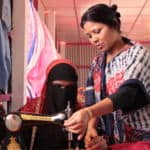Boosting STEM Training for African Women: Why Tech-Related Skills are Key to the Continent’s Progress
Around the globe, young women are discovering new opportunities in STEM (science, technology, engineering and mathematics) fields through community training programs. However, the skills gap between men and women is still wide.
As the world becomes more reliant on a digital tech economy, African women’s lack of technical skills is undermining their capacity to achieve their economic potential and boost the prosperity of their communities. But though this reality is discouraging, both for African women and the continent’s—and eventually the world’s—economy, it can provide a promising new development opportunity for the region, provided the right steps are taken by leaders and the public alike.
Below, I’ll explore some of the challenges that are preventing African women from pursuing STEM-related job skills or careers, and discuss some solutions to these issues.
Barriers to African Women’s Advancement in STEM-Related Fields
In some parts of sub-Saharan Africa, where connectivity is often unreliable, women have less internet access than their male counterparts. But this isn’t the only barrier preventing women’s advancement into tech-focused careers: Cultural norms that have traditionally considered STEM as a primarily male field also hinder many women’s involvement. As a result of these and other obstacles, Africa’s technology industry is made up of only 30% females, though currently 60% of women participate in the labor force in the region.
In response to these challenges, efforts are underway to facilitate the teaching of STEM principles, such as coding and robotics, to primary and secondary school-age children across the continent. But because of the gender bias and stereotyping that women across cultures often experience in STEM-related fields, some women are hesitant to fully engage in these activities. And these same obstacles can lead the young women who embrace technology in secondary school to give up on the STEM field before they join the workforce.
The same dynamic is playing out in sub-Saharan African universities, which are also not producing a high number of female STEM graduates. According to studies, many female students pursuing STEM fields in university drop out, often due to a number of factors that have a negative impact on their academic performance, including sexual harassment, limited access to university resources, negative social and individual feelings, and poor (or no) interventions by institutions aimed at supporting women.
Globally, women often outnumber men in life science courses and even outperform them academically, until they encounter the gender biases and stereotypes that tend to arise during team projects. In university, one’s peers can heavily influence a person’s educational and career choices, so these biases are not just hampering women’s sense of belonging and leading to less collaborative interaction, they are also driving some women from the STEM field. Without support and encouragement from their institution and instructors, many female university students who might otherwise consider a STEM career reconsider their academic and professional choices and pivot to a field they feel will be less resistant to their participation.
The Impact of STEM Training for Students and Working Women
To help address these issues, mentorship and support groups can be quite beneficial and influential in promoting STEM amongst female students. For example, the WAAW Foundation is an organization that focuses on mentoring secondary school students – especially girls – through STEM outreach chapters, to increase the pipeline of African girls entering STEM careers in colleges across Africa. Other initiatives that provide STEM-related opportunities for women in Africa are also gaining ground, such as the African Development Bank’s entrepreneurial and finance training, Women in Tech conferences, and Girls Who Code programs. And in a different approach, women already working in STEM careers are helping other women via informal mentoring and support systems, rather than relying on the government or corporate involvement.
These programs and individual efforts can be beneficial for female students pursuing or considering a STEM career. But how can an adult working woman with many years of employment still ahead of her change the course of her career to pursue new work in STEM-related fields? In some countries, women are comfortable with the idea of returning to a university setting or seeking new skills training online. Yet the technology gap in Africa makes it challenging for women to access — or build up the confidence to pursue — nontraditional learning. This presents an opportunity to support positive messaging and skills training aimed at women. For example, Merck Foundation is amplifying voices and introducing programs such as “More Than a Mother,” “STEM Program for Women” and “Educating Linda” in Africa and Asia, to provide more exposure for women in tech.
Girl Power Talk is another organization that connects women to STEM opportunities. We are consciously committed to hiring and training young women all over the world, but specifically in emerging economies in Africa and Asia. Since the onset of the pandemic, we have added women to our growing team from Kenya, Zimbabwe, Nigeria, Uganda, Mauritius and Tunisia. While we create impact through our team members, we also create awareness about STEM and the importance of learning through educational programs and collaborations with on-the-ground organizations.
Regardless of which organizations are involved and which women these efforts target, their impacts can be wide-ranging, since not every working woman needs to be directly involved in a STEM field to benefit from additional education in technology and the growing digital economy. Those in more traditional industries can be impacted too: For example, a solo business owner would benefit from being able to access the internet and leverage technology for advertising, customer management and banking. Taking advantage of the growing digital revolution would offer female entrepreneurs a better chance of being successful in business. Yet despite these benefits, many African women are still hesitant to enter tech-related fields.
Leveraging the Power of Storytelling to Highlight STEM Opportunities
African culture is based heavily on storytelling. To bring more women into the STEM field, new stories need to be amplified in the media — for instance, stories showing women from poor villages rising to prominence as scientists, engineers or entrepreneurs. Women are limited by an antiquated cultural system based on traditional patriarchy, which is likely perpetuated inadvertently by some people due to lack of awareness, and perhaps deliberately by others who benefit from the status quo. Incorporating this type of storytelling into the educational model in Africa would help give women and young girls the confidence to explore and pursue STEM opportunities without fear of discrimination, harassment or intimidation.
Representation matters, and hearing the stories of women who are already making a mark in this industry can create a powerful pull for younger girls. To that end, it’s useful to share the real-life stories of African women in STEM who are taking proactive action and encouraging other women to consider a new path. These trailblazers include Kenyan professor and Civic Tech Innovation Network coordinator Gecci Karuri-Sebina, who works with both the public and private sectors to inspire more women to explore STEM fields; and Ohemaa Adjei Andoh of Ghana, who helped found Girls in Science and Technology, which strives to bridge the gender gap in STEM through mentorship and training.
Highlighting the stories of real women excelling in STEM fields is a positive step towards increasing diversity and inclusion in the field. But fictional storytelling can also capture women’s imaginations and inspire them to consider new possibilities. For example, “Trust” is a graphic novel produced by Chief Nyamweya, a Kenyan illustrator and author, and Anne Connelly, a blockchain expert and one of Canada’s 50 Most Inspirational Women in Technology, according to Inspiring Fifty. The story follows Moraa, a young activist who travels back to her ancestral homeland and uses blockchain technology to transform her community. The authors offer both a print and a digital edition of their story, with the goal of giving everyone access to education about the uses of blockchain.
Other Ways to Build STEM Skills Among African Women
Whether it happens through individual mentorship, organizational support, storytelling or other approaches, developing new skills in STEM among African women is key to the continent’s development. From running a solo enterprise to rising through the ranks at a major corporation, African women can leverage knowledge in STEM and the diversity the field offers to pursue these opportunities.
Learning opportunities are available and can be leveraged to bridge the gap, such as Skills Initiative for Africa and other programs that help youth develop the required skills to compete in the corporate world. But while the opportunity to learn more about STEM fields might initially attract women to these initiatives, related programs that address challenges like dealing with sexual harassment, working in male-dominated fields and accessing childcare are equally important in retaining them.
Similarly, while cultural bias and geography play a major part in preventing sub-Saharan African women and girls from advancing their education and skills, they are not the only obstacles. For instance, the lack of financial means to attend postsecondary training is also a big deterrent for many women who might wish to pursue STEM-related careers. To address this challenge, national and international scholarships for African women continue to emerge, as institutions and countries around the world realize that the continent, which has the world’s fastest-growing workforce, is poised to drive the Fourth Industrial Revolution.
Pandemic closures have revealed that new skills are necessary for people to thrive in a post-COVID-19 world. The demand for technology-based skills will only continue to grow, as the world embraces the digital revolution and remote work. Rather than waiting for governments to act, individuals, non-governmental organizations, businesses and volunteer organizations that seek to empower women should begin creating opportunities for them now.
Rachita Sharma is the CEO of Girl Power Talk.
Photo courtesy of Vu Hoang.
- Categories
- Education, Technology



